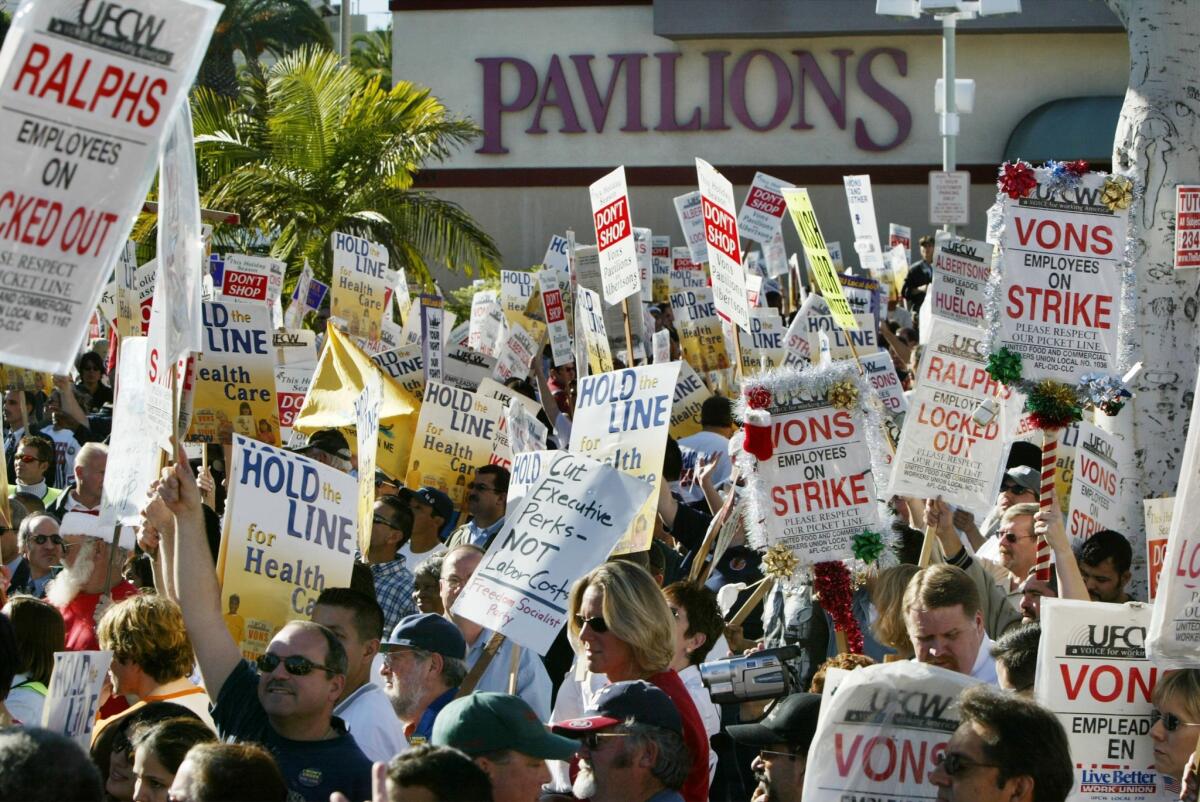Weakened grocery companies, workers square off over contract

- Share via
More than a decade after launching the longest major supermarket strike in the nation’s history, union representatives for Southern California grocery store workers are back at the bargaining table.
This time, there’s a third party in the room: a $15 minimum wage.
California’s schedule of steady increases to the wage floor, which will boost that wage to $15 an hour by 2022, is doing some of the work for the seven unions as they seek their fourth contract with the Ralphs and Albertsons chains since the epic 141-day strike that brought the region’s supermarkets to their knees in 2003-2004.
But the two big chains, which include Safeway, Vons and Pavilions stores, are looking to offset rising pay in other ways. That is likely to be the basis for any new confrontation.
“They are offsetting the cost of the minimum wage, they are trying to find ways to get around it,” said Rick Icaza, the president of United Food and Commercial Workers Union Local 770.
The starting wage for a worker at the two chains is $10.10, just over the current state minimum. The companies have proposed a raise of 10 cents per worker over the next three years and cuts to holiday pay; they also want to make it harder for entry-level employees to reach the highest pay grade, union officials said.
On June 20, 47,000 clerks, meatcutters, and merchandise stockers will have the chance to vote on whether to authorize a strike.
The union and the companies met on Monday, and have four other meetings scheduled over the next few weeks.
“I see negotiations as ongoing at this point, and certainly moving through the process to reach an agreement that is good for our associates and also keeps us competitive in a very tough market,” said Kendra Doyel, a spokeswoman for Ralphs.
A spokesperson for Albertsons did not respond to requests for comment.
Erika Bentzen, who has worked for Ralphs for 31 years, finds the company’s proposal disheartening.
“It does hurt, it’s like a slap in the face,” Bentzen said. The single mother works the graveyard shift, stocking merchandise at a Thousand Oaks store from midnight to 8:30 a.m., and makes $20.10 per hour, the most a Ralphs or Albertsons clerk can make without becoming a department head.
Bentzen has no desire to repeat the trauma of the strike, which forced her to take a second job and dip into her savings. But she says that her pay hasn’t kept up with the cost of living in Los Angeles.
“I don’t look at it as asking for more, we are just looking to survive here. We are looking for a decent wage for a good job,” Bentzen said.
Both sides are wearier and weaker today than they were in 2004.
“The strike in ‘03-’04 was like Armageddon; we did tons of damage but it also damaged the companies, to the extent that it hurt everyone,” said Kathy Finn, director of collective bargaining at UFCW Local 770.
The mayhem of picket lines more than a decade ago sent shoppers to ethnic markets or neighboring alternatives, like Trader Joes, which do not have unions to fight with. Many of those customers never came back.
“The unionized supermarket chains are getting caught in the crossfire from over half a dozen channels,” said Burt Flickinger, the managing director of the Strategic Resource Group, a retail consulting firm.
Kroger, which owns Ralphs and Food for Less, now has 17% of the grocery market in Southern California, down from 19% in 2004, Flickinger said. Albertsons bought Safeway, the Vons parent, in 2015, but it still has lost 5 percentage points of market share since the 2004 strike, and now controls 20%.
Goliaths like Walmart, Costco and Target, where the vast majority of workers aren’t unionized, swallowed up much of the difference.
The minimum wage hike will only increase the pressure on the chains, Flickinger said.
“It is going to be a huge factor for all of the retailers,” Flickinger said.
Union workers in Southern California supermarkets are already the second-highest-paid retail workers in the region, right below Costco employees, according to Flickinger’s analysis. The average union grocery worker makes $557 per week in Los Angeles, which amounts to about $13.90 per hour for a 40-hour week, more than the statewide minimum of $10 an hour.
Grocery store workers are in the midst of their own tailspin. Wages for clerks, baggers and everyone in between have actually declined after adjusting for inflation, hitting $28,964 per Los Angeles worker on average, down from about $31,175 per year in 2005.
The food industry, meanwhile, is growing. In 10 Southern California counties — from Imperial and San Diego north to San Luis Obispo and Kern — giant chains and independents are fighting over a market that is more than twice as big as the next largest, the New York-New Jersey metropolitan area, Flickinger said. Since the strike was resolved, employment has increased by 25% in Los Angeles locations.
But the new workers are signing up for jobs with fewer perks and dwindling hours.
See more of our top stories on Facebook >>
In 2004, the UFCW represented 59,000 workers at Ralphs, Albertsons and Vons. Now the union has about 12,000 fewer members at those and affiliated stores.
“Grocery store jobs look much more like fast-food jobs than they used to,” said Chris Tilly, director of the UCLA Institute for Research on Labor and Employment. “Lower pay, fewer benefits, more people part-time.”
Tom Hancock says that’s a familiar story. When the 60-year-old started working at Vons in 1995, he says it took him about two years to work his way from bagging groceries to the highest clerk-level pay at the store.
Most of the people around him were working more than 30 hours per week. Now, he says that the store is giving people fewer hours, while increasing the amount of time they need to put in before they can get a promotion.
“It takes longer for them to get anywhere,” he says. “It takes three times as long as it used to.”
Under the current contract, employees have to work upwards of seven years to make $20.10, the pay ceiling at the stores. Albertsons and Ralphs want to require employees to work several months more before reaching that pay rate, union officials said
Hancock says he’s most worried about his retirement savings, which took a hit when the union made concessions to secure a deal in 2004.
“They tore up the pension pretty much,” he says.
In 2004, the union agreed to a 35% cut in future pension returns for those working for companies before the strike; newcomers faced an even sharper reduction. The UFCW said that the companies are now pushing to increase their contributions to employee pensions by just 10 cents per hour, per year, down from a 20-cent increase they agreed to in the last contract.
The stores also want to force employees to retire at age 65, rather than 60, the union said.
Hancock bought his first computer a month and a half ago, and chose a Gmail address that referred to himself as a retired clerk.
“I’m looking ahead,” he said.
Follow me @NatalieKitro on Twitter
MORE BUSINESS NEWS
Lazarus: Republicans cook up plan to cripple consumer agency
Walgreens severs ties with blood-testing startup Theranos
Microsoft announces new look Xbox One to rival updated Sony PlayStation
More to Read
Inside the business of entertainment
The Wide Shot brings you news, analysis and insights on everything from streaming wars to production — and what it all means for the future.
You may occasionally receive promotional content from the Los Angeles Times.










